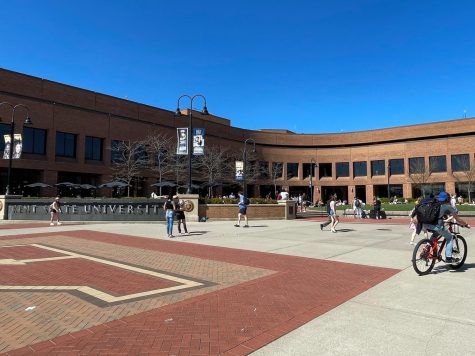International students pay own way
September 9, 2009
As tuition rises at universities around the country, obtaining federal loans is more important than ever for college students.
But not all students are eligible to rely on help from the U.S. government.
“If you are not a U.S. citizen, you cannot receive federal financial aid,” said Kristi Campbell, international student and scholar adviser. “Graduate students not receiving aid pay $23,587 (per year), and undergraduate students pay $27,000 (per year).”
International students must show proof they can cover the costs. The amount includes tuition, food, housing, medical insurance, books and supplies. Medical insurance is included in the projected costs for international students, but it isn’t required.
Campbell said health insurance, however, is highly recommended.
U.S. immigration laws also prohibit most international students from getting jobs off campus.
“It all depends on the type of student visa that is issued,” said David Di Maria, director of international student recruitment, admissions and advising. “Most international students at Kent State have F1 student visas, and their primary job is to study. We do have some J1 students, and they are sponsored by another entity.”
An F1 student visa is issued only for degree-seeking students. They must pay their own way and are not here on an exchange; they are here to earn a degree. F1 students are eligible to work on campus but are limited to a 20-hour workweek.
A J1 student visa is different. The student is sponsored by another entity, such as their government or organization.
“A J1 student is part of citizen diplomacy,” Di Maria said. “They came to the United States to study, teach or do research. Then they travel back home and share with their country the knowledge and culture they learned in America. They are unofficial ambassadors for their country and for the United States when they go back home.”
There are other options for international students struggling to pay for their education.
“If the student is in a Ph.D. or master’s program, they can apply for a grad assistant position,” Campbell said. “There are scholarships, such as the J scholarships, and if the student is a Fulbright or Muskie student, they have to apply for aid.”
Masha Brussevich, a senior economics major from Kazakhstan, has found many routes to pay for college.
“I got scholarships when I applied to Kent (State),” Brussevich said. “I used to be a (resident assistant). I thought it was a good opportunity, a great way to apply social skills, and I got to be hall enforcer. It was a lot of work. It was fun. But it was also kind of boring at times.”
Brussevich said she chose Kent State because she felt it was a good choice for her future.
“I always wanted to do something in business, and I like math,” Brussevich said. “I chose Kent State because it has a good College of Business and Administration, and I was familiar with the area.”
Tian Zhuang, freshman zoology major from China, was attracted to Kent State because of the environment.
“I liked this environment because it is smaller and better for studying,” Zhuang said. “Also, it was easy to be accepted here.”
“In high school, I was an exchange student in Chicago for 10 months,” Zhuang said. “Chicago is a big, loud city – not good for studying.”
Zhuang has an F1 student visa and is currently looking for a job on campus.
Contact honors and international affairs reporter Rebecca Mohr at [email protected].























